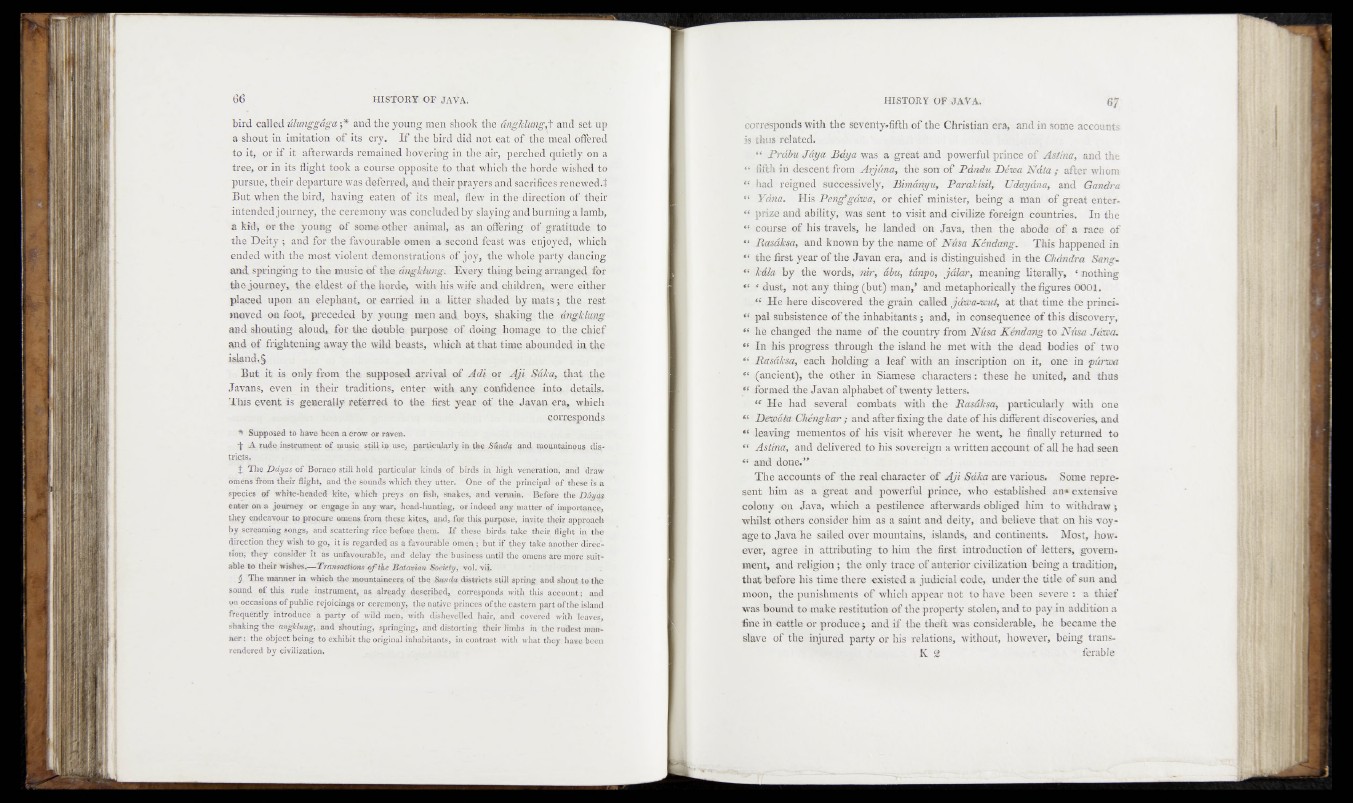
bird called dhmggdga ;* and the young men shook the angklungA and set up
a shout in imitation of its cry. I f the bird did not eat óf thé meal offered
to it, or if it afterwards remained hovering in the air, perched quietly on a
tree, or in its flight took a course opposite to that which the horde wished to
pursue, their departure was deferred, and their prayers and sacrifices renewed.t
But when the bird, having eaten of its meal, flew in the -direction of their
intended journey, the ceremony was concluded by slaying and burning a Iamb,
a kid, or- the .young of some other animal, as am offering of gratitude to
the Deity ; and for the favourable omen, a second feast was enjoyed, which
ended with the most violent demonstrations of jóy, the whole party dancing
and, springing to the music óf the c'mgkkmg... Every thing being arranged for
the journey, the eldest of the horde, with his wife and children, were either
placed upon an elephant, or tamed in % litter shaded mats; the rest
moved on foot, preceded fey young men and beys, shaking the dngkiwg
and shouting aloud, for tire double purpose of doing homage to the chief
and of fr%hteni»g away the wild beasts, wMeh at that time afeouaded haj the
island, S
But it is only from the supposed arrival of A d i 07 A ji Sdlca, that fhé
Javans, even in their traditions, enter with any coafidenfiO: into defedbu
This event is generally w^etred to the first year eS the Javan era, winch
corresponds
* Supposed to Iiave been a crow or raven.
~jr A rude instrument of music still in Use, particularly in the Suiida and mountainous dis- I
I still hold particular kinds of 'birds in high veneration, and 'draw
omens 'from their flight, and the sounds which they utter. One of the principal of these is a
species af white-headed feite, which preys on fish, snakes, and vermin. Before the D6y&»
enter on a journey or engage in any war, head-hunting,, or indeed any matter of importance,
they endeavour to procure omens from these, kites, and, for this purpose, .invite their approach
by screaming songs, and sc attmng rice before them. J f these birds take their, flight in the
direction they wish to go, it is regarded as a favourable omen but if they take another direction;
they consider it 'as unfavourable, and delay thé business until the omenk'are more suitable
to their wishes.—^Transactions oftfce Batavian Society, vol. vii-
§ The manner in which the mountaineers, of the, Sunda districts: still spring and shout to the
sound of this, rude instrument, as already described, corresponds with this account;; and
on occasions of public rejoicings or ceremony, the native princes of the eastern part of the.island
frequently introduce a party of wild men, with dishevelled hair, and 'covered with leaves,
shaking the anglclung,. and :shoütiüg', springing, énd distorting their limbs in 'the rudest manner!
the object being to exhibit the original inhabitants,, in contrast with what they have.-been
rendered by civilization.
corresponds with the seventy-fifth of the Christian era, and in some accounts
is thus related.
“ ■ Prdbu Jay a Bdya was a great and powerful prince of Astma, and the
“ fifth in descent from Arjuna, the son- of Pdndu Déwa Ndta ; after whom
1 had reigned successively, Bvmdnyu, Purakisit, Udaydna, and Gandra
“ Yana. His Peng’gdwa, or chief minister, being a man of great enter-
“ prize and ability, was sent to visit and civilize foreign countries. In the
**■ course of bis travels, he landed on Java* then the abode of a lace of
“ Bmaksa, and known by the name of NéSa Kéndang. This happened in
“ the first year of the Javan era, and is distinguished in the Chdndra Sang-
“ JcAlet by fee words* omr, Ha, tanpo, jdlatr, Jaeanittg literally* ‘ nothing
“ * diet, not any thing (but) man,’ and metaphorically the figures 0001.
‘.p f. die here discovered fee grain called jdxeaamt, at that time fee princi-
“ pal subsistence of the inhabitants; and, in consequence of this discovery,
M hè changed fee name of fee country from Nésa Kéndang to Nésa Jómu,
“ In his progress through the Maud he met with fee dead bodies o f two
“ Rasdksa, each holding a leaf with an inscription on it, one in purvoa
“ (ancient), fee other in Siamese characters; these be united, and feus
“ banned fee Javan alphabet of twenty letters.
u Me had several combats with fee Rasdksa, particularly wife one
• Chéngkeer ; and after fixing the date, of bis different discoveries* and
“ leaving mementos o f his visit wherever be went* he finally returned to
“ Astina, and delivered to his sovereign a written account of all he had seen
“ and done.’”
The acoounts o f the real character erf A ji Sdka are various. Some represent
him as a great and powerful prince, who established an* extensive
colony on Java, which a pestilence afterwards obliged him to withdraw},
whilst ethers consider him as a saint and deity, and believe feat on his voyage
to Java he sailed over mountains, islands, and continents. Most* how.
ever, agree in attributing to him the .first introduction of letters, government,
and religion; fee only trace of anterior civilization being a tradition,
that before his time there existed a judicial code, under the title of sun and
moon, the punishments of which appear not to have been severe ; a thief
was bound to make restitution of the property stolen, and to pay in addition a
fine in cattle or produce.; and i f the theft was considerable, he became the
slave of the injured party or his relations, without, however, being trans-
K % ' ferable